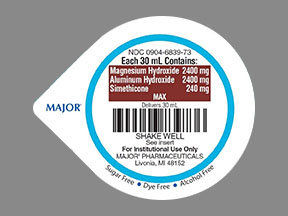
Antacid Advanced Coupons & Savings Card – Discount Prices from $5.41
Brand for: Alum & mag hydroxide-simeth
This medication is used to treat the symptoms of too much stomach acid such as stomach upset, heartburn, and acid indigestion. It is also used to relieve symptoms of extra gas such as belching, bloating, and feelings of pressure/discomfort in the stomach/gut. Simethicone helps break up gas bubbles in the gut. Aluminum and magnesium antacids work quickly to lower the acid in the stomach. Liquid antacids usually work faster/better than tablets or capsules. This medication works only on existing acid in the stomach. It does not prevent acid production. It may be used alone or with other medications that lower acid production (including H2 blockers such as cimetidine/ranitidine and proton pump inhibitors such as omeprazole). If you are self-treating with this medication, carefully read the package instructions before you start using this product to be sure it is right for you. Some products have similar brand names but different active ingredients with different uses. Taking the wrong product could harm you. Ask your pharmacist if you have any questions about your product or its use.
Our Antacid Advanced coupons are free to use. You can print the coupon, email it to yourself, or receive the Antacid Advanced coupon via text message. To get your free discount, show the pharmacist your Antacid Advanced savings card which has the discounted coupon price. Use our filters below to edit the prescription box to match your needs. The Antacid Advanced prices will update based on your prescription needs. Above our Antacid Advanced coupons, you can change the location to see pharmacy prices in other areas. Our prescription discount card will update online with the specific pharmacy costs associated with your edits. Be sure to text, email, or print the Antacid Advanced savings card code that you need after editing the prescription box and location field. Show the discount card to your pharmacist before paying.
My prescription
Edit
30ML of 400-400-40MG/5ML, Alum & Mag Hydroxide-simeth (1 Cup)
Select pharmacy

Walgreens
$5.41
COUPON PRICE
Albertsons
$8.21
COUPON PRICEAntacid Advanced savings card
Show this card to your pharmacist
Walgreens
$5.41
BIN
ID
PCN
GRP
019876
LH337A2031
CHIPPO
LHX
Powered by
This medication is used to treat the symptoms of too much stomach acid such as stomach upset, heartburn, and acid indigestion. It is also used to relieve symptoms of extra gas such as belching, bloating, and feelings of pressure/discomfort in the stomach/gut. Simethicone helps break up gas bubbles in the gut. Aluminum and magnesium antacids work quickly to lower the acid in the stomach. Liquid antacids usually work faster/better than tablets or capsules. This medication works only on existing acid in the stomach. It does not prevent acid production. It may be used alone or with other medications that lower acid production (including H2 blockers such as cimetidine/ranitidine and proton pump inhibitors such as omeprazole). If you are self-treating with this medication, carefully read the package instructions before you start using this product to be sure it is right for you. Some products have similar brand names but different active ingredients with different uses. Taking the wrong product could harm you. Ask your pharmacist if you have any questions about your product or its use.
Our Antacid Advanced coupons are free to use. You can print the coupon, email it to yourself, or receive the Antacid Advanced coupon via text message. To get your free discount, show the pharmacist your Antacid Advanced savings card which has the discounted coupon price. Use our filters below to edit the prescription box to match your needs. The Antacid Advanced prices will update based on your prescription needs. Above our Antacid Advanced coupons, you can change the location to see pharmacy prices in other areas. Our prescription discount card will update online with the specific pharmacy costs associated with your edits. Be sure to text, email, or print the Antacid Advanced savings card code that you need after editing the prescription box and location field. Show the discount card to your pharmacist before paying.
Antacid Advanced FAQs
Using the SaveHealth discount card, what is the price of Antacid Advanced without insurance?
Using the SaveHealth discount card, the price of Antacid Advanced without insurance is $5.41.
What is the price of Antacid Advanced at Walgreens?
The price of Antacid Advanced at Walgreens is $5.41.
